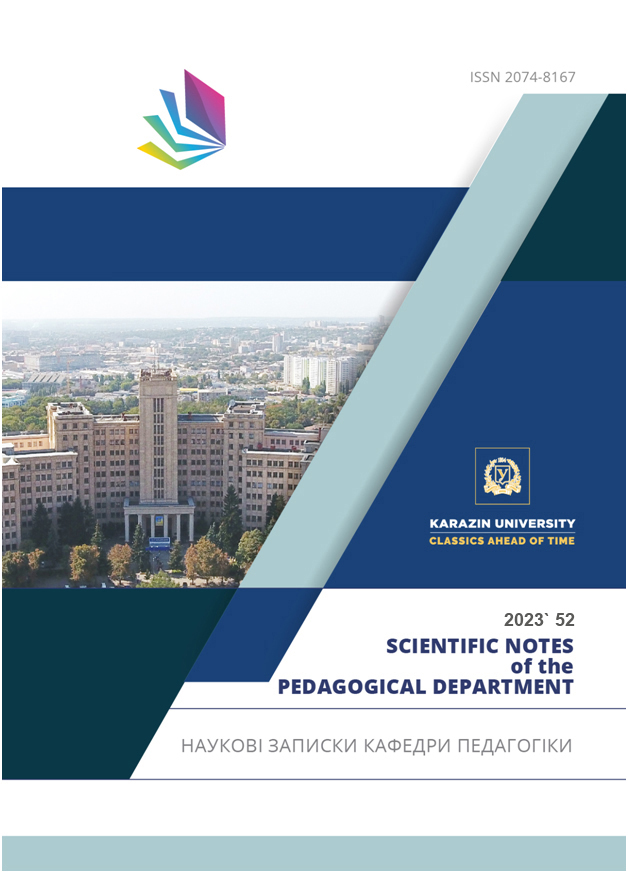Hackathon as an active learning format in higher education institutions
Abstract
The article is devoted to the topical issue of foreign language teaching methods in higher educaton institutions - the creation of a modern methodological framework for the educaton and training of future specialists in any field of professional actvity.Therefore, we consider changes in methodological approaches in teaching to be appropriate and necessary. An analysis of scientific research on the above-mentioned problem is presented in the article and the need to find the latest formats for creating a methodical base during the professional training of a future specialist who is ready to work in the conditions of modern changes and new standarts is emphasized. The purpose of the article is to show the possibilities of using a hackathon as an effective learning format that promotes the development of critical thinking in higher education students, which in turn meets the requirements of the modern format of the professional training of a future specialist in any field.
Downloads
References
Dolgova, O. V. (2017). Hackathon as an innovative form of STEM education: experience of practical activity of student self-government leaders. Theoretical and methodological problems of children and student youth education. № 21(1). С. 180-190. [in Ukrainian].
Kalinina, L.V., Papizhuk, V.O. (2023). Hackathon as an innovative format of professional and methodological training of future foreign language teachers in the context of the new Ukrainian school. Scientific journal “Innovative Pedagogy”. Issue 55. Volume 2. [in Ukrainian].
Kolyadenko, S. V. (2020). The impact of the digital economy on globalization. Economics, finance, management: actual issues of science and practice, № 2, С. 104-118. [in Ukrainian].
Petrovych, S., Tychuk R. B. (2016). Using the technology of critical thinking development in the process of conducting an educational hackathon. Computer in school and family: scientiꢀic and methodical journal. № 5. С. 16-20. [in Ukrainian].
Romaniuk, I. (2016). Implementation of innovative educational activities in an educational institution. The practice of managing an educational institution. № 2. С. 23–33. [in Ukrainian].
Addyman, C. Ivanof, B. E. (2016). Open Research for Academics: how to be an academic in the twenty-first century. URL: https://blogs.lse.ac.uk/impactofsocialsciences/2016/10/25/open-research-for-academics-how- to-be-an-academic-in-the-twenty-first-century/.
Facione, P. A. (1990). Critical thinking: A statement of expert consensus for purposes of educational assessment and instruction. The Delphi report. Millbrae, CA: California Academic Press.
Groen,D.,Calderhead,B.(2015). Science hackathons for developing interdisciplinary research and collaborations. eLife URL: https://www.ncbi.nlm.nih.gov/pmc/articles/PMC4511834/.
Hogan, M., & Young, K. (2021). Designing group assignments to develop groupwork skills. Journal of Information Systems Education, 32(4), 274–282.
Johnson, D. W., Johnson, R. T., Holubec, E. J. (1994) Cooperative Learning in the Classroom. Association for Supervision and Curriculum, P. 110.
Kagan J. (2022). Networking: What It Is and How to Do It Successfully. URL: https://www.investopedia.com/ terms/n/networking.asp.
Linnell, N., Figueira, S., Chintala, N., et al.: (2014). Hack for the homeless: A humanitarian technology hackathon. In Global Humanitarian Technology Conference (GHTC), IEEE. 2014; pp. 577–584. URL: http://ieeexplore.ieee. org/document/6970341/?reload=true.
Linton, G., & Klinton, M. (2019). University entrepreneurship education: A design thinking approach to learning. Journal of Innovation and Entrepreneurship, 8(1), 1–11.
Lipman, M. (1988). Critical thinking: What can it be? Educational Leadership. (46)1, 1988. – P. 38–43. [in English]. 15. Mubaraz, S., Heikkilä, J., Luomakoski, J., & Khan, R. (2021). Students’ self and peer assessment practices: A case of hybrid entrepreneurial hackathon. In 15th International Technology, Education and Development Conference. International Academy of Technology Education and Development.
Paul, R. and Elder, L. (2010). The Miniature Guide to Critical Thinking Concepts and Tools. Dillon Beach: Foundation for Critical Thinking Press.
Paul Richard, W. (1990) Critical Thinking: What Every Person Needs to Survive in a Rapidly Changing World. Rohnert Park, CA: Center for Critical Thinking and Moral Critique, Sonoma State Univ. P. 49.
Ribault, S., Bessaguet, H., Ardaillon, H., Rousson, G., Nivesse, D., Fareh, T., et al. (2022). To other new educational ways for interdisciplinary cooperation and innovation: About a student-driven hackathon. MedEdPublish, 12(20), 20.
Stoltzfus, A, Rosenberg, M., Lapp, H .et al. (2017) Community and Code: Nine Lessons from Nine NESCent Hackathons.
Warner, Jeremy, Guo Philip, J. (2017). Hack.edu: Examining How College Hackathons Are Perceived by Student Attendees and Non-Attendees. ACM International Computing Education Research conference (ICER). DOI: 10.1145/3105726.3106174.
Wilson, J., Bender, K., & DeChants, J. (2019). Beyond the classroom: The impact of a university-based civic hackathon addressing homelessness. Journal of Social Work Education, 55(4), 736–749. 22. Wood, C. (2013). Who Invented the Hackathon? URL: https://www.govtech.com/data/who-invented-the- hackathon.html.

